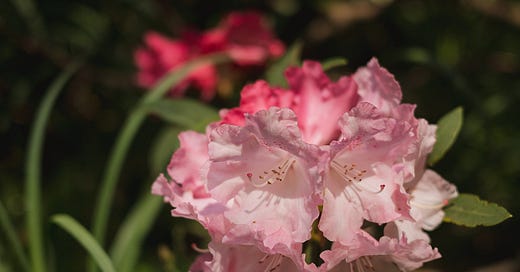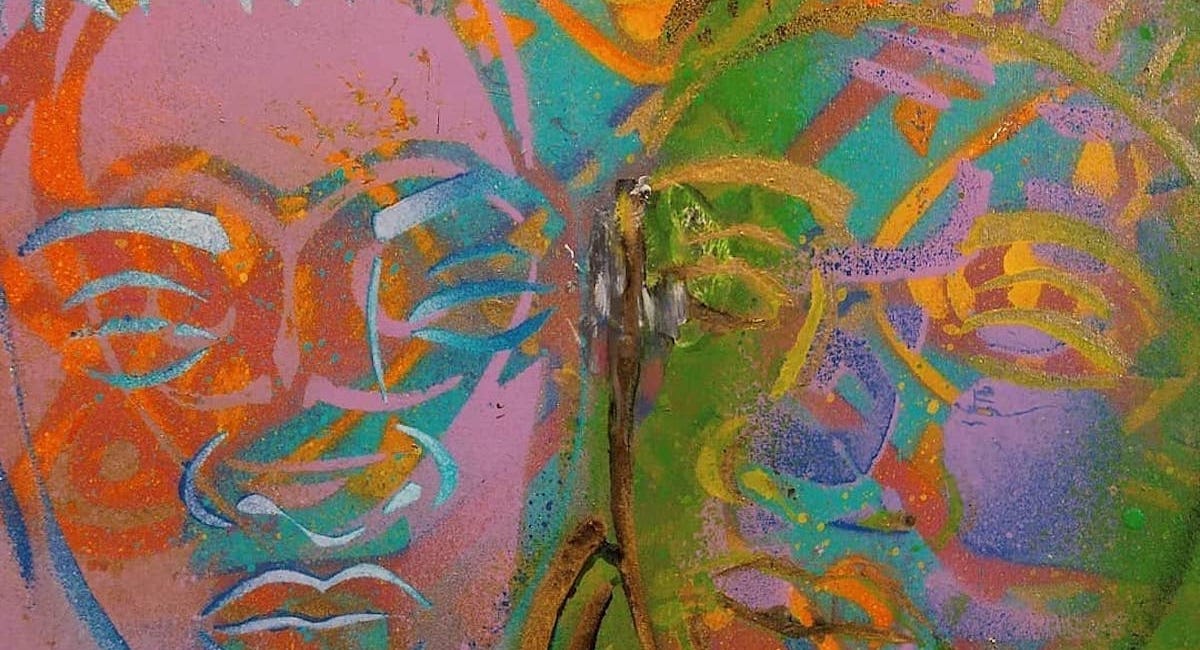PHOTO BY JESS DRAWHORN
Although we published Black & Native Attention As Miracle in 2022, this anthology continues to shape our publishing praxis. From Dr. Kyle Mays’ reflection on building kinship across difference to Valencia Gunder’s interview on community organizing during crisis, we’re grateful for the many contributors who shared their stories with us.
Today, we want to amplify contributor Mia Birdsong. In conversation with PLANTCRAFT creator Amirio Freeman, facilitator and futurist Mia Birdsong illuminates a radical vision for building community that feels especially resonant right now. Although the conditions are changing (endlessly, everyday), Mia connects us to practices for liberation that have roots. It’s this ability to weave together both grounded practice and big picture thinking that makes Mia—author of the invaluable How We Show Up: Reclaiming Family, Friendship, and Community—such a source of inspiration. By encouraging us to engage in abundant community building, reconsider who we build community with, and expose the mythologies that threaten interconnectivity, we hope Mia’s reflections can be as medicinal for you as they have been for us.
The following conversation has been edited for length and clarity.
Amirio Freeman: So first and foremost, who are you and what do you do?
Mia Birdsong: That's a great question. I feel like that is a question I'm still trying to answer. And I want to make the distinction between who I am, who I be, and what I do.
I'm a Pisces, Libra rising — which I've been deeply feeling recently — and Libra moon. I feel like I'm on this journey right now to give a lot of spaciousness for all of my Pisces and Libra attributes, which is my empathy, my love for beauty and aesthetic, my dreaminess, my love of daydreaming.
I think that as I navigated through my 20s and 30s, the things that were affirmed in me as a person were not about my empathy and my dreaminess. It was all the shit I feel like Black women often learn to do, which is hustle, work twice as hard for half as much, making a way out of no way. And I appreciate all of the skills and the things I've learned from being that way, but now that I'm about to be 48, I'm deciding when I will deploy those skills as opposed to hiding my whole self behind them.
Who else am I? A small circle of Black women I am part of has developed a really beautiful relationship with our redwood and eucalyptus elders recently. First of all, I'm like, "Oh my God. Why didn't I know this before? Why didn't I know that y'all were my relatives?" I have so much to learn from them.
Second of all, trees have jokes. They're not jokes I can repeat because the translation from tree to human — I haven't figured that out. But trees have some funny shit to say. They also live in tree time. They're not trying to hurry around like human beings. They look at us sometimes and they're just like, "Y'all! What are you doing? This is not working out for you. You need to slow the fuck down. Just take a breath."
My tree elders remind me to pause, take a breath, and to stand in the long arc of time, and remember that my life is connected to all of the other lives that exist on the Earth right now, but there's this forward momentum that I'm in. I'm on a trajectory that is going to be connected to my descendants, and the things that I'm doing, the things that I'm building, the ways that I'm showing up in the world are not just for me and for whoever is here now, but also for whoever comes after us. And that relieves me of a sense of urgency, and the anxiety that comes from feeling like, "Oh my God. I need to make this happen right now."
What do I do? I listen. I collaborate. I hold space. I find humor. I love really hard. I'm fundamentally driven by our collective liberation. I very specifically care about the liberation of Black women, but I also am clear that we don't get free unless everybody else does. So, I am invested in the liberation of people who are not Black women as well. And sometimes they don't even know that they need to get free. I'm talking to you, white people and wealth hoarders. In the social justice spaces I’m part of, we rightly focus a lot on our own liberation, organizing, and building power. And I know that part of my role is participating in that. Another part is working with people who don't know that they're not free, to open their eyes to that, because we need them to get their shit together, too.
Amirio: I think so many of us are in that place of re-thinking who our elders are, especially now that we have the slowness and stillness to really reconsider who we're in community with. And because of that, many more of us are fully coming to the realization that we can be in community with the more-than-human world. We’re gardening and we're hiking and we're finding ways to summon new types of intelligences.
I think a huge part of that shift is coming out of this sense that human intelligence is what got us into this crisis point in the first place. How can we tap into other ways of being, other ways of knowing, other epistemologies that, like you said, get us to that place of a more collective, liberated future? I want to know more about that journey. How did you come to the space of recognizing that community can look like the trees, can look like the sky, clouds, all of that?
I'm thinking of Alexis Pauline Gumbs. In Dub: Finding Ceremony, she talks about, “What does it mean to embody this idea of being ‘kindred beyond taxonomy?’” So, how did you get to that place, and how has that new kindredness changed you?
Mia: I think that it is a remembering. In the States, the dominant culture has socialized us to understand ourselves as separate from nature. It is something to explore, it's something to conquer, it's something to cultivate and take from. It's a very detached, broken understanding of what it means to be human. Because, in fact, we are nature.
The idea that you have to go to some other place to be in the natural world doesn't make any sense when you understand that you are nature — not only because we're animals and evolved as part of the world around us, but also because the planet is in us. The minerals that exist in soil exist in our bones and our blood. We are water — salt water. We are the fucking ocean.
Humans and plants exchange air. We generate heat, like fire, we have electricity in our nervous system. When I think about what exists out there, I'm like, “Oh, it also exists in me, too, because they are the same thing." So I think gaining this clarity — and I feel like I'm in the beginning of it — is about reconnecting to something, a relationship and a connection that's already there and I have to remember it. We have to remember it. We have to rediscover it.
There was this period during the pandemic when everything slowed down that was a time of rediscovery for me. The tulips had come up. I have an apple tree in my yard, and it was blossoming. And here where I live, that's one of the ways that you know that it's the beginning of swarm season for bees. I'm a beekeeper, and I've learned from other folks around me who keep bees what else I should be paying attention to besides just my bees to know what's going on with them. Bees are amazing teachers, let me tell you, for so many things.
Anyway, during that period of time, April-ish, May — it was after the beginning of spring — I just remember spending so much time sitting in my backyard and listening. There was no traffic. The BART train goes right by my house, so that was not running very often. I could hear birds, I could hear wind. I noticed that different types of birds would come through at different times of day. Robins came in the morning, fly catchers in the afternoon.
I’m also a gardener, and gardeners develop deep ways of observing. I'll plant kale in the late winter, and once the weather warms all of a sudden there are aphids on my kale. And when I was first gardening, I would panic and try to figure out, “What's the non-toxic thing I need to do to get rid of the aphids?”
And then, as I matured in my gardening, I was like, "I don't need to do anything because I know that the ladybugs will come soon, as long as I have planted flowers and things that ladybugs need in order to live." They don't live where the aphids are, they live on the flowers. And that's just something I learned from listening, from watching what happened. And then I have all these amazing ladybugs in my yard, which is super cool, and beautiful flowers, and my kale doesn't get completely eaten by aphids.
For me, I’ve found that this remembering and rediscovering gets turned on when I’m able to practice tuning into non-human parts of the natural world. It wakes up some dormant ways of knowing. I have a yard and bees to practice with, but it’s also my houseplants and dogs, and the trees that line my block, and the wind and sky.
Keep reading with a 7-day free trial
Subscribe to Loam to keep reading this post and get 7 days of free access to the full post archives.





